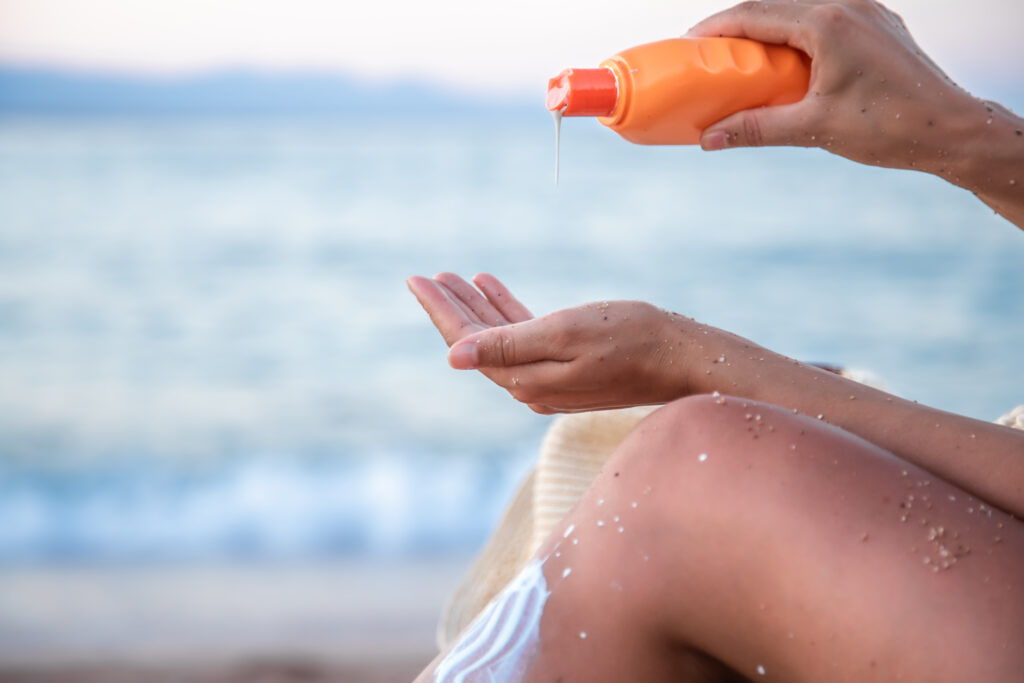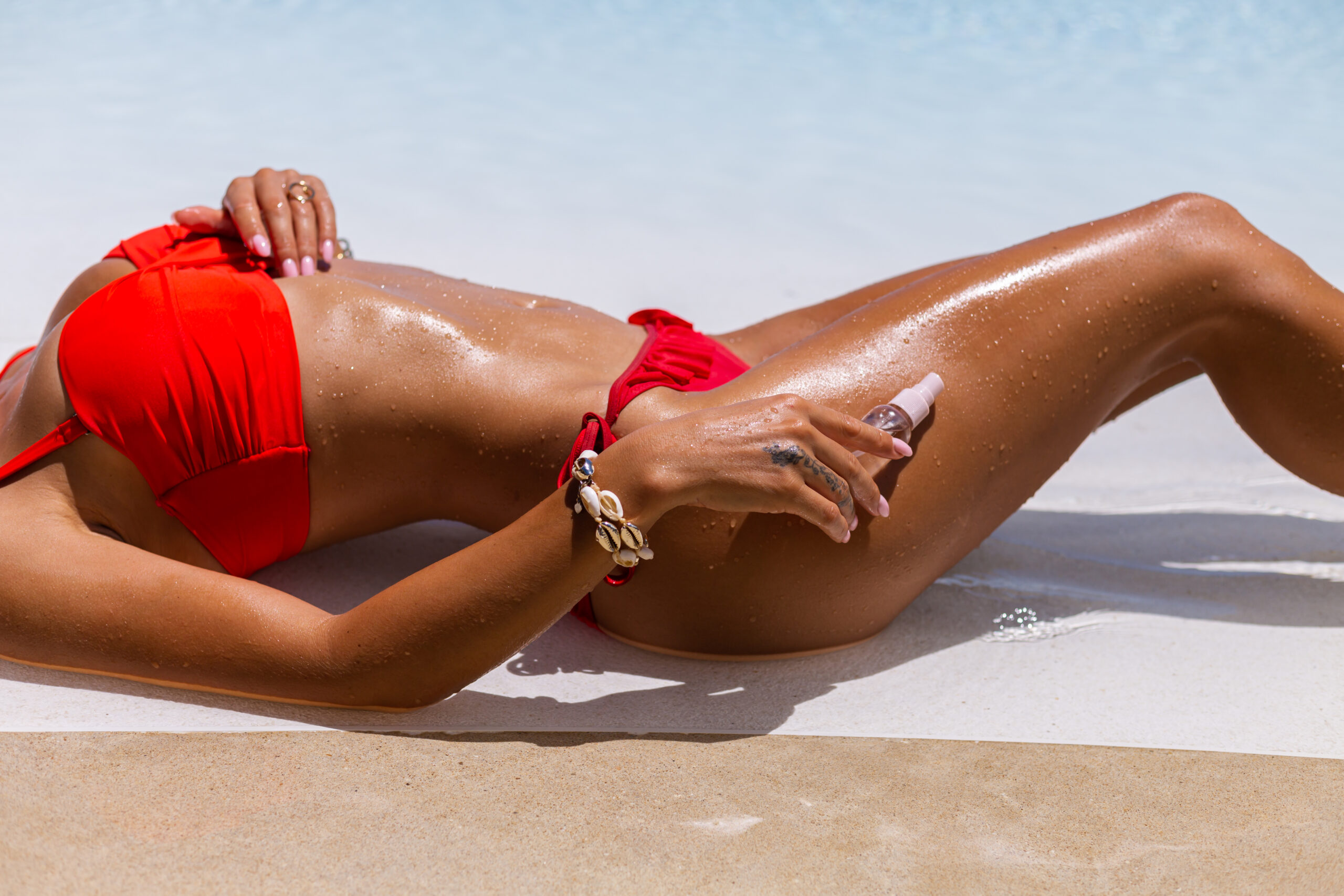You’ve just had laser hair removal and are feeling great, ready to show off your smooth legs in the sun. But wait! It’s important not to rush into tanning or applying fake tan right after your laser hair removal sessions. Your skin needs time to heal and recover.
Since laser hair removal uses concentrated light beams to target and destroy hair follicles, your skin is more sensitive to external factors, including UV radiation from the sun, after a session. So, if you tan too early you open yourself up to many unwanted side effects.
That doesn’t mean you can’t ever go into the sun, it just means you have to wait a little while. However, if you ask us, it’s a small price to pay for hair-free skin!
How Long Should I Wait Before Tanning After Laser Hair Removal?
While the procedure offers many benefits, exposure to direct sunlight is a big no-no directly after a laser treatment. It is generally recommended to wait at least 2-3 weeks before exposing the treated area to the sun. This waiting period allows your skin to heal and reduces the risk of complications such as hyperpigmentation, burns, or irritation. The exact timeframe can vary depending on your skin type and the specific area treated, so it is essential to follow the advice of your laser technician.
There are several precautions you can take to avoid sun exposure, which we explore below.
Why Is It Important to Avoid the Sun After Laser Hair Removal Treatments?
Avoiding sun exposure after laser hair treatment is crucial for several reasons that directly impact not only the effectiveness of the treatment, but also the health of your skin.
Increased Sensitivity and Risk of Hyperpigmentation
After laser hair removal, your skin is more sensitive and vulnerable to UV damage. Sun exposure during the healing phase can lead to hyperpigmentation, causing treated areas to become darker than the surrounding skin. UV rays stimulate melanin production, which can accumulate unevenly in healing skin, resulting in blotchy or patchy pigmentation that may take weeks or even months to fade.
Risk of Burns and Irritation
Post-treatment skin is highly sensitive and prone to sunburn. Even minimal sun exposure can cause significant burns, pain, and further damage, prolonging the healing process. UV rays can also exacerbate skin irritation, leading to redness, swelling, and discomfort. Protecting your skin from the sun ensures it heals properly without these additional stressors.
Compromised Treatment Effectiveness
Sun exposure can interfere with laser hair removal results. The treatment targets hair follicles by focusing on their pigment. Tanned skin makes it harder for the laser to distinguish between hair and skin pigment, reducing the laser’s effectiveness. This may necessitate more sessions to achieve the desired outcome, increasing the overall cost and time commitment.
Increased Risk of Side Effects
Sun exposure post-treatment can heighten the risk of side effects such as blistering, scarring, and prolonged redness. The skin’s barrier is temporarily weakened after treatment, making it less able to protect itself against UV radiation. Protecting your skin from the sun helps minimize these risks and ensures a smoother recovery process.
Prevention of Long-Term Damage
Repeated UV exposure can cause long-term skin damage, including premature aging, fine lines, wrinkles, and increased skin cancer risk. After laser hair removal, your skin is more vulnerable, and protecting it from the sun helps prevent these long-term effects, ensuring your skin remains healthy and undamaged.
Can I Tan Before My Laser Hair Removal Session?
It is highly recommended to avoid tanning before your laser hair removal session. Ideally, you should refrain from sun exposure and tanning beds for at least four weeks prior to treatment. Tanned skin increases the risk of side effects and makes it harder for the laser to effectively target the hair follicles. If you must be in the sun, use protective measures such as high-SPF sunscreen and protective clothing to minimize UV exposure.
Can I Use Self-Tanning Products After Laser Hair Removal?
Self-tanning products offer a safer alternative to sunbathing or tanning beds, but they still require caution after laser hair removal. Wait at least 1-2 weeks before applying any self-tanners. These products can contain chemicals that might irritate freshly treated skin.
Using self-tanners too soon can also obscure the laser’s target, potentially affecting future treatments. When you do decide to use a self-tanner, opt for hypoallergenic and non-comedogenic products to minimize the risk of irritation.
What Precautions Should I Take If I Need to Be in the Sun After Laser Hair Removal?
While it is best to avoid direct sun exposure after laser hair removal, sometimes it is unavoidable and you should take the necessary precautions.
Use Sunscreen Diligently
Using sunscreen is crucial. Choose a broad-spectrum sunscreen that protects against UVA and UVB rays, with an SPF of at least 30, though SPF 50 is preferable for extended outdoor activities. Apply sunscreen generously to treated areas 15-30 minutes before going outside and reapply every two hours, or more often if swimming or sweating. If you are near water or expecting to sweat, use a water-resistant sunscreen.

Wear Protective Clothing
Wearing protective clothing can significantly reduce UV exposure. Cover the treated area with lightweight, long-sleeved shirts and pants made from tightly woven fabrics. Consider clothing with an Ultraviolet Protection Factor (UPF) rating, which blocks UV rays more effectively than regular clothing, and always wear a hat.
Seek Shade
Seeking shade is essential. The sun’s rays are strongest between 10 AM and 4 PM, so try to stay indoors or in shaded areas during these hours. Use an umbrella or parasol to create your own shade when outside for extended periods. Be mindful of reflective surfaces like water, sand, and snow, which can increase UV exposure. Even in urban environments, reflective surfaces like buildings and pavements can amplify sun exposure.
Avoid Tanning Beds
Avoid other sources of UV exposure, such as tanning beds, which emit concentrated UV radiation harmful to your skin, especially post-laser hair removal. Be cautious with artificial UV light sources, like certain office and home lighting, as prolonged exposure can still affect your skin.
Stay Hydrated
Keeping your skin hydrated is essential for healing. Drink plenty of water and use a gentle moisturizer to maintain skin hydration. Limit alcohol and caffeine intake, as they can dehydrate your skin and body, making your skin more susceptible to damage.
Speak To One of Our Professionals
Personalized advice is crucial. At Bloom Health and Wellness Studio, you will meet with one of our healthcare professionals (doctor or nurse) so that they can provide recommendations based on your treatment specifics, including suitable products and additional precautions. Attending follow-up appointments is important to monitor your skin’s healing process and address any concerns or side effects promptly.
Laser hair removal has become a popular choice for those who want a silky smooth summer body without regularly having to shave, pluck or wax those unwanted hair, and advanced laser technology has made it possible for almost anyone to receive laser hair removal treatments, even those with darker skin types.
If you’re considering laser hair removal services or if you want to book an appointment to continue a treatment schedule, contact Bloom Health and Wellness Studio. We are committed to helping you achieve the best results from your laser hair removal treatment.
Jennifer Sinclair
Author
7/01/2024
POSTED
All You Need to Know About Tanning After Laser Hair Removal

I have been seeing Dr.Sinclair for many years and have been extremely impressed with the quality of service. I've always had the most natural and pleasing results.
What Our Clients Say
Dr.Sinclair constantly updates her knowledge of new products and techniques. I wouldn't go anywhere else!
What Our Clients Say
Dr.Sinclair is a true professional, intuitive and skill practitioner who acts with sensitivity and integrity at all times.